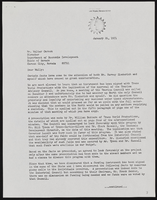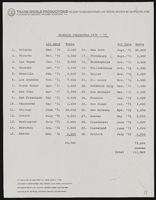Search the Special Collections and Archives Portal
Search Results
Josiah Edward Spurr Papers
Identifier
Abstract
Collection consists of an original manuscript, "Geology and Ore-Deposition at Tonopah, Nevada" by Josiah Edward Spurr (1870-1950) with hand-drawn diagrams, and letters discussing the donation of the manuscript. The manuscript, which was published in the journal Economic Geology in 1915, is a geological description of the Tonopah mining area; the Tonopah Mining Company is mentioned frequently. It is undated, but the publication date suggests it was written approximately 1913-1915.
Archival Collection
Ilene Bittle Collection on Basic High School
Identifier
Abstract
The Ilene Bittle Collection on Basic High School (1942-1982) is comprised of assorted memorabilia and visual materials from Basic High School in Henderson, Nevada. Materials includes scrapbooks, newspaper clippings, event programs and invitations, newsletters, and other school mementos. Black-and-white negatives, photographs, and transparencies of various school events, faculty and staff, and student life are also included in the collection.
Archival Collection
Steven Hart Papers
Identifier
Abstract
Papers are comprised of photographs, newspaper clippings, and correspondence dating from the 1950s to the 1980s collected by Steven Hart, son of the Las Vegas, Nevada chef, Nat Hart. The papers include information about Steven Hart's childhood and his service in Vietnam. Also included in the collection are photos of Steven Hart's father, Nat Hart.
Archival Collection
Fine, Mark L., 1946-
Mark Fine was born February 10, 1946 in Cleveland, Ohio, and was raised with a strong Jewish identity. When Fine was in fourth grade, his parents moved the family to Shaker Heights, and again moved to Arizona during his senior of high school. Upon graduation, Fine enrolled at the University of Arizona and became a member of the Zeta Beta Tau fraternity. He graduated in 1964 with a degree in business administration with an emphasis in real estate.
Person

Transcript of interview with Judy Jetter by Lisa Gioia-Acres, September 10, 2008
Date
Archival Collection
Description
Judy Jetter, a devout jazz music enthusiast, was born in a Chicago suburb in 1939. At the age of three, Judy began taking acting as well as tap and ballet classes. While raised by her mother until age 15 Judy was forced to study opera even though jazz music was her passion. Her first introduction to jazz came while listening to, legendary jazz great, Woody Herman on the radio. Judy developed an instant appreciation and love for jazz music. While working as a commercial actress during her childhood - Super Circus and Peter Pan peanut butter - Judy experienced live performances by the Stan Kenton Orchestra and was completely amazed. After graduation Judy was married and gave birth to her son. She worked for a movie studio in Chicago doing various jobs such as cleaning the stage, typing scripts, model work, and even playing the role of housewife. Later Judy went to college and earned a degree in psychology, which led to a job as a therapist. However, after remarrying to Bill Jetter, Judy switched careers and soon became an exercise instructor at the YMCA. There she cultivated her passion for working with people who suffered from disabilities. In particular, Judy developed a water regiment specifically designed for people with disabilities. Judy would go on to share her experiences in this field in two subsequent book publications. Unfortunately Judy's husband passed away with cancer. However, Judy found refuge and support from a group of jazz enthusiasts. Alongside her cadre, Judy began really studying how to listen to music. She moved to Las Vegas in 1992 and can often be found at different jazz venues throughout the city. She enjoys the local jazz scene in Las Vegas and making her weekly rounds to take-in Big Band and jazz singers such as Jobell and Terri James, as well as going to see Bruce Harper playing at Bugsy's, and the talented Gus Mancuso performing at the Bootlegger. Judy believes that music, like everything else, has evolved and will continue to mature; however, jazz musicians such as Louis Armstrong still remain as the foremost contributors in the long history of jazz music. Her hope is that music and the arts will continue to be offered through education to allow the next generation another "dimension to not only their education but their soul."
Text

Jocelyn Cortez interview, March 18, 2019: transcript
Date
Archival Collection
Description
Interviewed by Nathalie Martinez. Jocelyn Cortez is a Salvadoran-American immigration lawyer. She grew up on the Eastside of Las Vegas and grew up going to school in the Clark County School District and at UNLV before going to Law School at the University of Arizona. She is an engaged community member as an immigration lawyer working alongside the Culinary Union and the Latino Bar Association.
Text

Madeline Taylor Knighten interview, November 6, 1974: transcript
Date
Archival Collection
Description
On November 6, 1974, collector Jay Brewer interviewed Madeline Taylor Knighten (born July 7th, 1907 in Chanute, Kansas) at her home in Boulder City, Nevada. In the interview, Madeline Taylor Knighten discusses her life in the early days of Boulder City, Nevada. She also speaks about her husband’s work in the Green Hut Café, as well as in diamond drilling.
Text

Transcript of interview with Edwina E. Danzienger by Leanne Terry, February 26 & 29, 1980
Date
Archival Collection
Description
On February 26 and 29 of 1980, Leanne Terry interviewed Edwina E. Danzinger (born 1925 in Houston, Texas) about her life in Southern Nevada. Danzinger first talks about her family, specifically her siblings, children, and grandchildren. She also talks about church membership, early housing in Nevada, her husband’s work on the Nevada Test Site, and her family’s hunting practices. Danzinger then describes her involvement in Boy Scouts and hiking, her various positions of employment at the University of Nevada, Las Vegas, how the college campus has changed over time, and how the college students have changed over the years. The two also talk about the changes in the crime rate, the atomic testing, air pollution, and the changes made to the university by the Buckley Amendment.
Text


